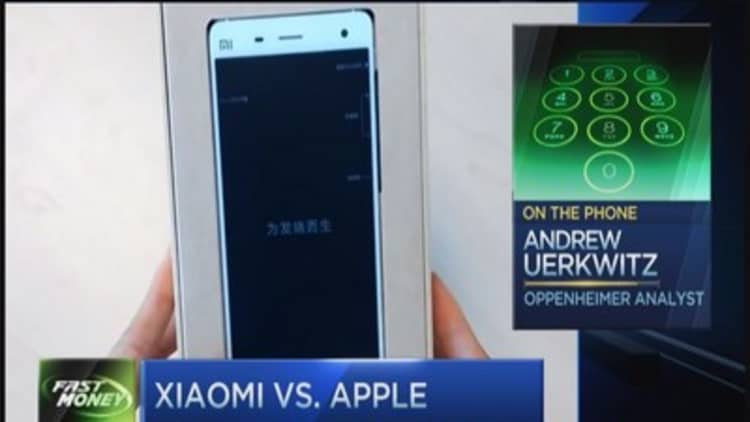China's Xiaomi Technology rung in the New Year with a triple-digit percent revenue increase, but investors shouldn't pop champagne corks yet, analysts say.
Xiaomi recorded $11.97 billion in 2014 pre-tax sales, an annual increase of 135 percent, CEO Lei Jun announced in a Weibo post over the weekend. The privately-owned firm also sold 61 million smartphones last year, a 227 percent jump from 2013. In comparison, sales of Samsung's smartphones declined in the third quarter of 2014 while iPhone sales rose 26 percent on year, according to Gartner data.
"I don't think Xiaomi can repeat this astounding growth of 135 percent, it's a case of too big, too soon," said Cyrus Daruwala, managing director at IDC Financial Insights. "We're definitely in wait-and-see mode; investors are not looking to raise their profile on Xiaomi yet. The results are too dramatic and can only go downhill from here."
Read MoreWhat's behind rapid rise of 'China's Apple' Xiaomi?
Vital components of the firm's business model remain missing, Daruwala added: "We are unclear as to their research and development (R&D) plans. What is their sourcing strategy in terms of commodities and raw materials? In manufacturing, will they embrace a high-end or low-end focus? We also need more clarity with regards to regional and global expansion plans."
Other analysts are also cautious, questioning the company's sustainability amid its massive hype in the tech world. With a market valuation of $45 billion, Xiaomi has been called tech's most valuable start-up and is currently the third-largest smartphone maker.
Lei's weekend blog post lacked profit figures, but a regulatory filing released in December indicated worrisome profitability levels. The tech firm logged an operating margin of 1.8 percent in 2013, far behind Samsung's 18.7 and Apple's 28.7 percent. Many experts attributed the poor performance to the firm's low-cost, large volume strategy in phone manufacturing.
Intensifying domestic competition also remains a key headwind for Xiaomi as Lenovo, Coolpad and Huawei all have plans to copycat its low-cost smartphone model, said Tom Kang, director at Counterpoint Research.

Content vs hardware
Worries over the firm's long-term growth are also in focus as it tries to present itself as an Internet firm rather than a handset maker: "Developing hardware is just a part of Xiaomi's businesses, and the driving forces behind those devices are its software and Internet content,'' said CEO Lei last month, according to media reports.
Xiaomi is heavily focused on content, said Ryan Huang, market strategist at IG. By acquiring content providers in its ecosystem like digital game maker Gameloft, e-book retailer Beijing Doukan as well as video sites Youku Tudou and iQiyi, it's providing value-added services to lock in users from leaving the brand, like Apple did with iTunes, Huang added.
However, confidential data leaked in November proves the company still has a long way to go before calling itself an Internet play. 94 percent of 2013 revenue came from handset sales, The Wall Street Journal reported in November.
Read MoreXiaomi's expansion is under threat
Xiaomi's hopes for diversification aren't just limited to the Internet. Last month, it unveiled a new air purifier that can be controlled via mobile phone, Counterpoint Research's Kang pointed out, adding that its high customer loyalty will enable it to grow beyond consumer electronics.
"I do believe Xiaomi's overall revenue will continue to expand, it just may not come entirely from phones," he said.
Meanwhile, CIMB believes the firm is headed for another stellar performance in 2015, but strictly based on smartphone sales: "We believe that Xiaomi's growth momentum will persist into 2015, driven by the improvement in its supply chain and overseas expansion. Xiaomi now targets to ship 100 million smartphones in 2015, a jump of 67 percent on-year."

